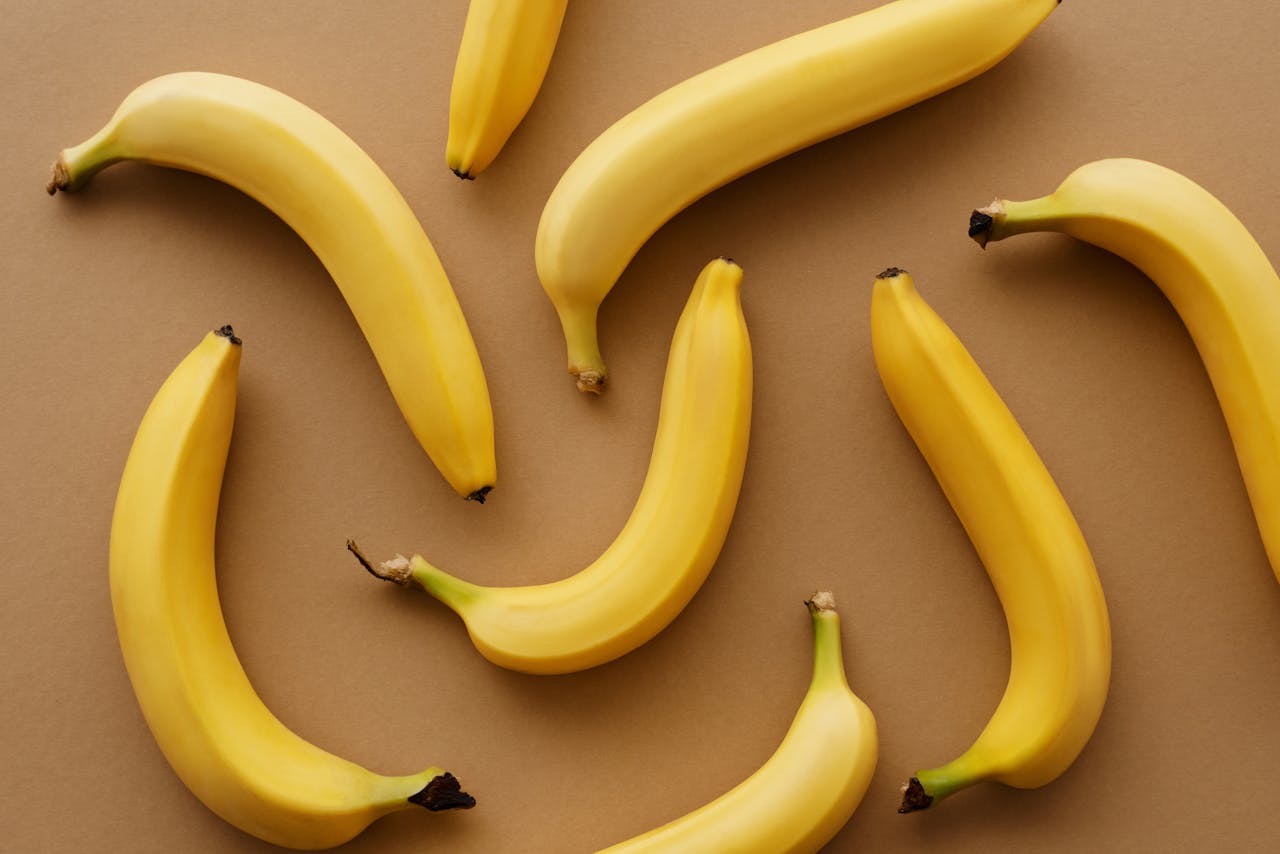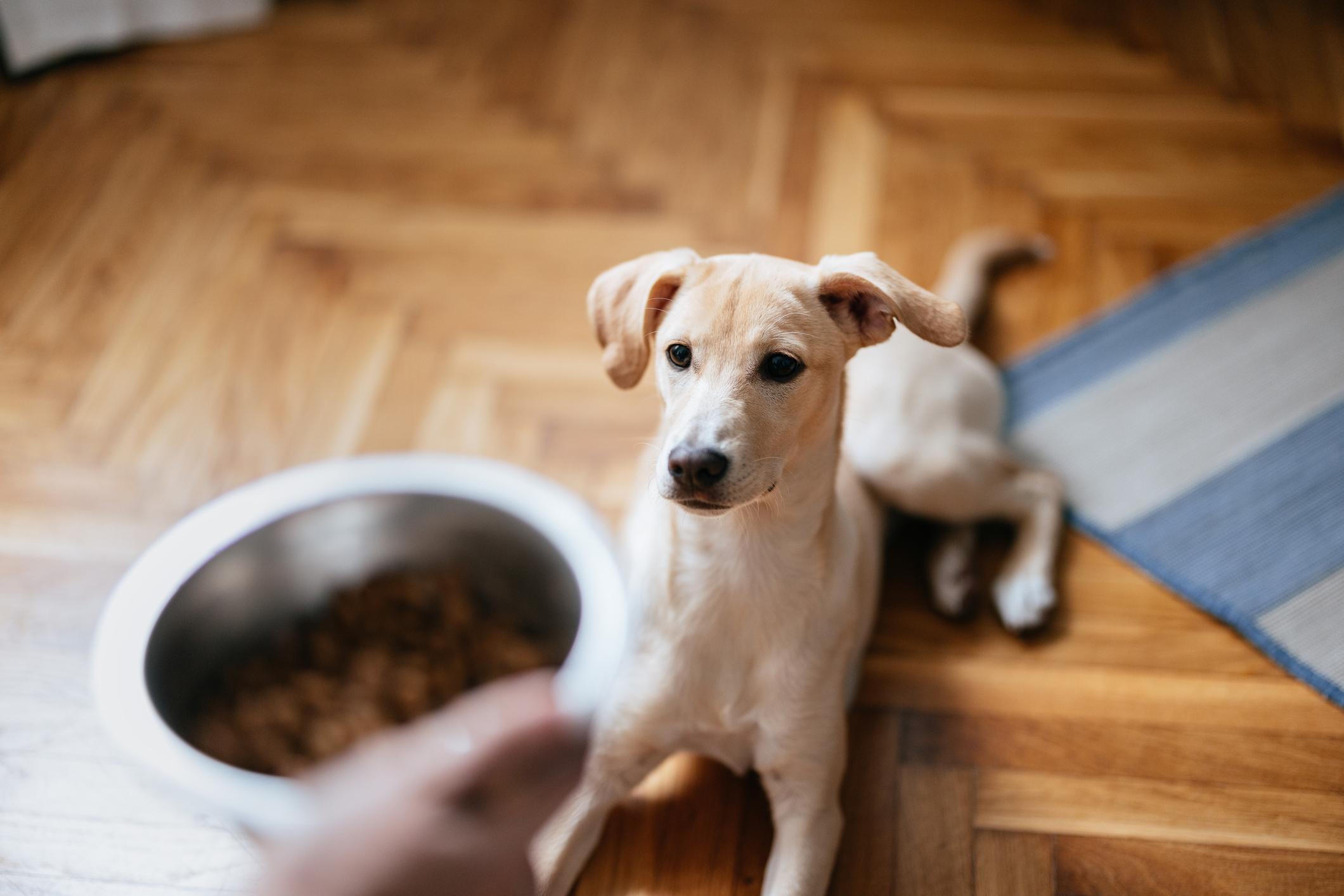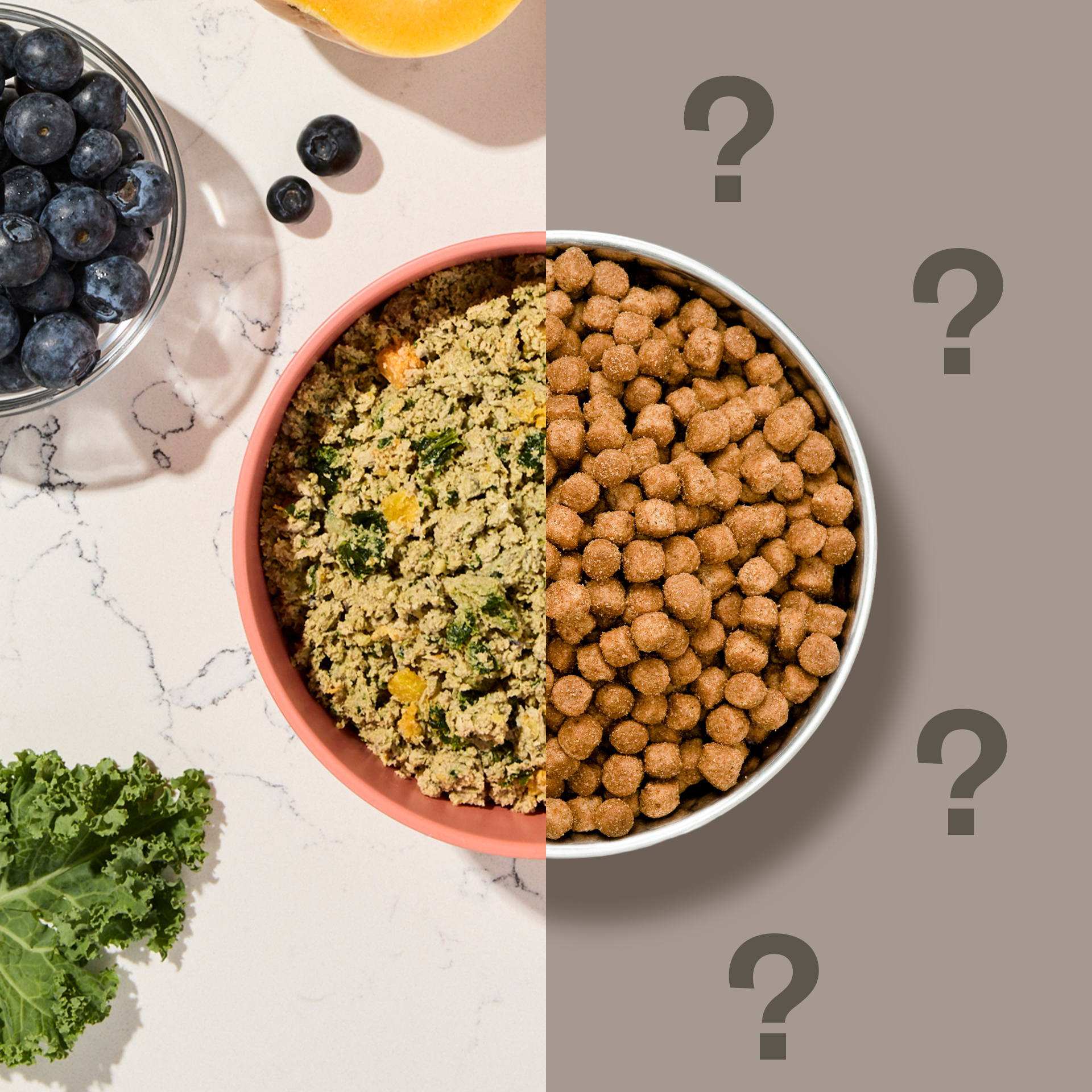Hey Ollie blog readers! We’re offering you an exclusive 60% OFF your starter box! Try now!
Bananas are a popular and nutritious snack for humans, but what about dogs? If you’ve ever caught your pup staring at you while you enjoy a banana, you might wonder if it’s safe to share. The good news? Yes, dogs can eat bananas!
Bananas are a natural, low-calorie treat that provides essential nutrients like potassium, fiber, and vitamin B6. They can be a great alternative to processed treats, especially for dogs with food sensitivities. However, as with any treat, moderation is key. While bananas are packed with benefits, feeding too much can lead to digestive issues or unnecessary sugar intake.
In this guide, we’ll break down everything you need to know about bananas for dogs—the benefits, how much to feed, the best ways to serve them, and any potential risks. Plus, we’ll share how you can incorporate bananas into a balanced diet alongside Ollie’s fresh, vet-crafted meals to keep your pup happy and healthy.
Key Takeaways
- Bananas are a safe and healthy treat for dogs when given in moderation. They provide important nutrients like potassium, fiber, and vitamin B6.
- They support digestion and energy levels but should only be an occasional treat due to their natural sugar content.
- A balanced diet is key! Pairing treats like bananas with Ollie fresh, human-grade meals ensures your pup gets complete and optimal nutrition.
Can Dogs Eat Bananas?
Yes! Dogs can eat bananas, and they are a safe, nutritious treat when given in moderation. Bananas are non-toxic to dogs and offer several health benefits, making them a great alternative to processed treats. Many dogs love the naturally sweet taste, and since bananas are soft and easy to digest, they’re suitable for dogs of all ages—including puppies and senior dogs.
However, while bananas are healthy, they should only be given as an occasional treat rather than a regular part of your dog’s diet. Bananas contain natural sugars, which can contribute to weight gain or digestive issues if overfed. The key is portion control and ensuring they complement a balanced diet, like one based on Ollie’s fresh, vet-crafted meals, which provide complete nutrition tailored to your pup’s needs.
In the next section, we’ll take a closer look at the specific benefits of bananas for dogs and how they can support your pup’s health!
Are Bananas Safe for Dogs?
Yes, bananas are safe for dogs and can be a great addition to their treat rotation. They’re non-toxic, easy to digest, and packed with beneficial nutrients. Many vets even recommend bananas as a healthier alternative to processed treats, especially for dogs that need a low-fat or low-calorie option.
That said, while bananas are generally safe, there are a few things to keep in mind:
Potential Risks of Feeding Bananas to Dogs
- High in Natural Sugar – Bananas contain natural sugars, which, if eaten in excess, can lead to weight gain or impact blood sugar levels, especially in dogs with diabetes.
- Digestive Upset – Too much banana can cause mild digestive issues, including an upset stomach or constipation. Start with a small amount to see how your pup reacts.
- Banana Peels Are Hard to Digest – While not toxic, banana peels are tough and fibrous, making them difficult for dogs to digest. Eating a peel could lead to stomach discomfort or even a blockage in small dogs.
How to Safely Feed Bananas to Your Dog
To ensure your pup enjoys bananas safely:
- Peel the banana first and only offer the soft fruit.
- Feed in moderation based on your dog’s size (we’ll cover portion sizes in the next section!).
- Watch for any signs of digestive issues like bloating, diarrhea, or constipation. If your dog has a sensitive stomach, introduce bananas slowly.
Bananas can be a fun, occasional treat when served properly. But for complete and balanced daily nutrition, it’s best to focus on high-quality meals like Ollie’s fresh, human-grade dog food, which is packed with all the essential nutrients your pup needs.
Benefits of Bananas for Dogs
Bananas aren’t just a tasty snack—they also offer several health benefits for dogs when given in moderation. This naturally sweet fruit is packed with essential vitamins and minerals that can support your pup’s overall well-being.
1. Rich in Essential Nutrients
Bananas are loaded with potassium, vitamin B6, and vitamin C, which support:
- Heart health – Potassium helps regulate blood pressure and supports muscle function.
- Brain function – Vitamin B6 plays a key role in brain development and cognitive health.
- Immune system support – Vitamin C helps boost immunity and fight off illness.
2. Supports Healthy Digestion
Bananas are high in dietary fiber, which can help regulate your dog’s digestion. A small amount can:
- Aid in digestion – Helps keep things moving smoothly in the digestive tract.
- Relieve mild constipation – The fiber in bananas can provide gentle relief for occasional constipation.
- Soothe an upset stomach – Bananas contain pectin, a natural prebiotic that supports gut health.
3. Provides a Natural Energy Boost
Bananas contain natural carbohydrates that give dogs a quick energy boost. This makes them a great pre-workout snack for active pups before a long walk or play session.
4. A Great Training Treat
Since bananas are soft, easy to chew, and low in calories, they make an excellent reward during training. You can cut them into small pieces for quick, bite-sized motivation during obedience training or agility exercises.
Pro Tip: While bananas make a great treat, they shouldn’t replace a balanced diet. For complete, vet-crafted nutrition, consider Ollie’s fresh meals, made with real, whole ingredients to support your dog’s long-term health.
How Much Banana Can a Dog Eat?
While bananas are a healthy snack, portion control is key to keeping your pup’s diet balanced. Too much banana can lead to an upset stomach or extra sugar intake, so it’s important to feed them in moderation based on their size.
Recommended Banana Portions by Dog Size
Here’s a general guideline for how much banana is safe for dogs to eat:
- Small dogs (under 20 lbs) – 1–2 small slices (about the size of a quarter)
- Medium dogs (20–50 lbs) – A few slices (about ¼ of a banana)
- Large dogs (50+ lbs) – Up to half a banana
- Puppies – Even smaller portions! Start with a tiny piece and monitor for any reactions.
How Often Can Dogs Eat Bananas?
Bananas should be an occasional treat, not an everyday snack. A few slices once or twice a week is plenty to enjoy the benefits without overloading your dog with sugar.
Signs Your Dog Has Eaten Too Much Banana
If your dog eats too much banana, they may experience:
- Digestive upset – Loose stool, constipation, or bloating.
- Increased thirst – Due to the natural sugar content.
- Weight gain – Over time, excess treats (even healthy ones) can lead to extra pounds.
How to Safely Serve Bananas to Dogs
There are plenty of fun and creative ways to serve bananas to your pup! Whether you want a quick treat or a homemade snack, here are some safe and easy ways to give your dog bananas.
1. Fresh Banana Slices (Quick & Easy)
The simplest way to serve bananas is to slice them into small, bite-sized pieces. This makes for a quick reward or a healthy topper for your dog’s regular food.
2. Mashed Bananas (Great for Picky Eaters)
Mashing a small amount of banana into your dog’s food can enhance flavor and texture, making it a great option for picky eaters. Try mixing it with Ollie’s fresh, human-grade meals to add a naturally sweet touch!
3. Frozen Banana Chunks (Cool Summer Treat)
For a refreshing summer snack, freeze banana slices and serve them cold. They make a great teething treat for puppies and a cooling snack for hot days.
4. Banana-Filled Kong or Lick Mat (Long-Lasting Fun)
Stuff a Kong toy or spread mashed banana onto a lick mat for a stimulating treat. To make it extra special, mix in a little peanut butter (xylitol-free) or plain yogurt.
5. Homemade Banana Dog Treats (DIY Fun)
You can use bananas as an ingredient in homemade dog treats! Try mixing mashed banana with oats and baking small biscuits. This way, your pup gets a tasty, preservative-free snack.
Pro Tip: When adding bananas to your dog’s diet, always pair treats with a balanced meal. Ollie’s fresh dog food is packed with real, high-quality ingredients to give your pup the best nutrition possible!
Can Bananas Be Bad for Dogs?
While bananas are a safe and healthy treat, there are a few potential downsides to watch for. Feeding too much or serving them the wrong way can lead to digestive issues or other health concerns. Here’s what to keep in mind:
1. Too Much Sugar Can Cause Weight Gain
Bananas contain natural sugars, which, while healthier than processed sugars, can still contribute to weight gain if overfed. This is especially important for:
- Dogs prone to obesity.
- Senior dogs with slower metabolisms.
- Dogs with diabetes or blood sugar concerns (always check with your vet first).
Solution: Stick to recommended portion sizes and balance treats with a nutritious diet, like Ollie’s fresh, protein-rich meals, which provide optimal nutrition without excess sugar or fillers.
2. Digestive Issues from Overfeeding
Too much banana at once can lead to:
- Constipation – Bananas contain fiber, which is helpful in small amounts but can cause blockages if overfed.
- Diarrhea – The natural sugars and fiber can lead to loose stools in some dogs.
- Upset stomach – If your dog isn’t used to bananas, they might experience mild stomach discomfort.
Solution: Introduce bananas slowly and feed them in moderation. If your dog shows signs of digestive upset, reduce the portion or skip bananas altogether.
3. Banana Peels Are Hard to Digest
While banana peels aren’t toxic, they are difficult to digest and may cause blockages, especially in small dogs. If your pup accidentally eats a peel, monitor them for signs of:
- Vomiting.
- Constipation or difficulty pooping.
- Loss of appetite.
Solution: Always peel bananas before serving, and keep peels out of reach. If your dog eats a large piece of peel and shows symptoms, contact your vet.
4. Allergic Reactions (Rare, But Possible)
While rare, some dogs may have an allergy or sensitivity to bananas. Signs of an allergic reaction include:
- Itching or skin irritation.
- Swelling of the face or paws.
- Difficulty breathing (seek immediate vet care if this happens).
Solution: If your dog has never had bananas before, start with a small bite and watch for any unusual reactions. If you notice allergy symptoms, avoid bananas and consult your vet.
Pro Tip: To avoid digestive issues or excess sugar intake, balance occasional treats like bananas with Ollie’s fresh, vet-crafted meals, made with high-quality proteins and nutrient-dense ingredients to support overall health.
Other Fruits Dogs Can Eat (and Avoid)
Bananas aren’t the only fruit that can be a healthy treat for dogs. Many fruits are packed with vitamins, fiber, and antioxidants—but some can be harmful. Here’s a quick guide to safe and unsafe fruits for dogs.
Safe Fruits for Dogs
These fruits are dog-friendly when served in moderation and without seeds, pits, or rinds:
- Apples – Great source of fiber and vitamin C (remove the seeds).
- Blueberries – Packed with antioxidants that support brain health.
- Strawberries – A natural source of vitamin C and fiber.
- Watermelon – Hydrating and low in calories (remove seeds and rind).
- Pineapple – Contains digestive enzymes, but serve in small amounts due to sugar content.
- Cantaloupe – A sweet, hydrating treat (no seeds or rind).
Want to enhance your pup’s diet with real, wholesome ingredients? Try Ollie’s fresh, human-grade meals, made with vet-approved nutrients for optimal health.
Fruits to Avoid
Some fruits are toxic to dogs and should never be fed:
- Grapes & Raisins – Can cause kidney failure, even in small amounts.
- Cherries – Contain cyanide in the pits and stems, which is dangerous for dogs.
- Avocado – Contains persin, which can be toxic in large amounts.
- Citrus Fruits (Lemons, Limes, Grapefruits) – Too acidic and can cause stomach upset.
If your dog eats any of these harmful fruits, contact your vet immediately.
The Bottom Line: Fruits like bananas, apples, and blueberries make great occasional treats, but always research before feeding your dog a new fruit. If you’re looking for a complete, balanced diet with fresh, real ingredients, Ollie’s vet-formulated meals are a great way to keep your pup happy and healthy!
Final Thoughts On Bananas For Dogs
Bananas can be a safe, tasty, and nutritious treat for dogs when given in moderation. They provide essential vitamins, fiber, and a natural energy boost, making them a great alternative to processed snacks. Whether served fresh, mashed, or frozen, bananas can be a fun way to reward your pup while supporting their health.
However, portion control is key. Since bananas contain natural sugars, they should be an occasional treat, not a daily snack. Avoid banana peels, introduce new foods slowly, and always monitor your pup for any signs of digestive issues or allergies.
Looking for a well-balanced diet beyond treats? Ollie’s fresh, human-grade meals provide complete, vet-formulated nutrition tailored to your dog’s needs. By pairing wholesome meals with occasional healthy treats like bananas, you can help your pup thrive!
Frequently Asked Questions About Bananas for Dogs
Here are answers to some of the most common questions about feeding bananas to dogs!
Can puppies eat bananas?
Yes, but in very small amounts! Puppies have sensitive stomachs, so start with a tiny piece and monitor for any signs of digestive upset.
Can dogs eat banana peels?
It’s best to avoid banana peels. They aren’t toxic, but they’re tough to digest and may cause stomach discomfort or even a blockage, especially in small dogs.
Can dogs eat bananas every day?
No, bananas should be an occasional treat—not a daily snack. Feeding a few slices once or twice a week is ideal to avoid excessive sugar intake.
What if my dog eats too much banana?
Too much banana can cause digestive issues like constipation, diarrhea, or bloating. If your pup has an upset stomach, offer plenty of water and reduce banana portions in the future. If symptoms persist, contact your vet.
Can I mix bananas with my dog’s regular food?
Absolutely! Mashed bananas can be a fun food topper. Just be mindful of portions. For a nutritionally complete diet, try Ollie’s fresh, human-grade meals, made with real, vet-formulated ingredients to keep your pup happy and healthy.
Tagged As:

The nutrition your dog needs,
the food they want.

Enjoying our articles? Subscribe our Newsletters and get new articles directly to your inbox
You might also like
18 August 2025
9 MINS READ
Nourish Skin from Within: Fresh Dog Diet Benefits
If your dog is constantly scratching, licking their paws, or has a dull, flaky coat, it’s not just frustrating—it could be a sign that something’s off in their diet. Skin and coat issues are som…
by Ollie Pets
12 August 2025
5 MINS READ
Top 8 Allergens Hiding in Your Dog’s Bowl
As pup parents, we never want to see our dogs uncomfortable. When it comes to itching, swelling, and upset stomachs, the culprit may be in their bowl. Understanding the most common allergens and t…
by Ollie Pets
11 August 2025
5 MINS READ
Not all Processing Is Equal: What’s Really in Your Pet’s Bowl?
As pet parents, we know how important it is that our dogs live long, healthy, and happy lives. This is why at Ollie, we focus so much on what goes into their bowls. But did you know there may be s…







